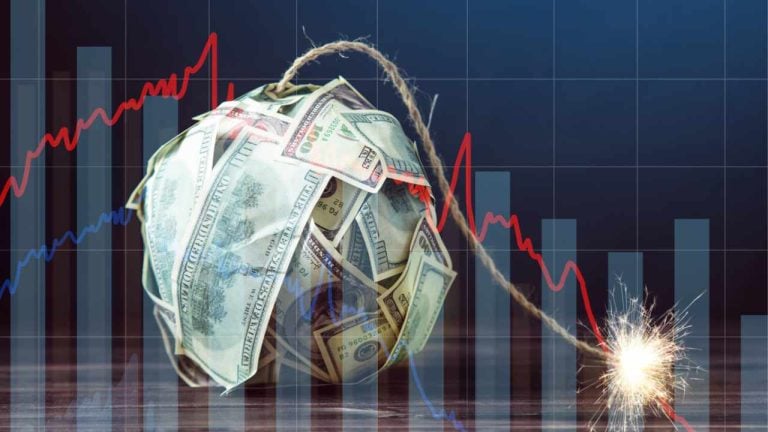
Economist Peter Schiff Predicts Inflationary Depression
Economist Peter Schiff has issued a warning about the U.S. economy, stating that the country is heading towards an inflationary depression. Schiff believes that inflation will remain high for an extended period, leading to a severe and prolonged recession. He points out that the escalating national debt and federal budget deficits will ultimately result in a collapse in the demand for U.S. dollars. According to Schiff, once the dollar starts to fall, Treasury yields will rise at an accelerated pace.
Peter Schiff's Views on Inflation, Recession, and Depression
In recent social media posts, economist and gold bug Peter Schiff reiterated his concerns about the U.S. economy and the U.S. dollar. Schiff believes that the ongoing financial and economic crisis is long overdue and has been foreseeable for years. Despite the obvious signs, he predicts that the media, government, academia, and the Federal Reserve will claim that it was impossible to foresee. Schiff further emphasizes that interest rates will stay high for a longer duration due to prolonged inflation. This, in turn, will deepen and lengthen the upcoming recession, resulting in what he terms as an "inflationary depression."
Schiff also commented on Federal Reserve Chair Jerome Powell's remarks regarding the economy. He argues that Powell wrongly attributes the current inflation to the pandemic. According to Schiff, the inflation problem was aggravated by the Fed and the federal government through substantial budget deficits and excessive money printing to fund stimulus checks during the pandemic. Schiff criticizes Powell for disregarding the impact of fiscal policy on monetary policy, deeming it a reckless admission that will define Powell's failed legacy.
The Collapse of US Dollar Demand
One of Schiff's key arguments is that the primary use of U.S. dollars has been to purchase Treasuries. However, as major buyers become sellers and the national debt and federal budget deficits continue to rise, demand for dollars is expected to plummet. Schiff predicts that once the dollar starts to decline, Treasury yields will increase rapidly.
He highlights the diminishing confidence of bond investors in the Fed's ability to bring inflation down to the target rate of 2%. This loss of confidence is reflected in the rising yields of 30-year Treasuries, currently at 5.1%. However, Schiff believes that this yield is not sufficient to offset the impact of high inflation over a 30-year period. As a result, he anticipates a significant increase in bond yields across the curve. Short-term yields are predicted to rise from 5.5% to 6%, while long-term yields are expected to surge from 5% to 7%-8%. Given the substantial debt burden, Schiff argues that the U.S. economy cannot sustain a normal yield curve and hints at the possibility of quantitative easing in the near future.
Schiff does not foresee any further interest rate hikes, citing the ongoing Middle East conflict and the uncertainty it brings. He even suggests the possibility of rate cuts. Schiff has been consistent in warning about an impending bond market crash and an unprecedented financial crisis. His concerns extend to the collapse of the U.S. dollar, emphasizing that the day of reckoning is imminent.
What are your thoughts on economist Peter Schiff's warnings about the U.S. economy and the U.S. dollar? Share your opinions in the comments below.
Frequently Asked Questions
How much of your portfolio should be in precious metals?
To answer this question, we must first understand what precious metals are. Precious metals have elements with an extremely high worth relative to other commodity. This makes them very valuable in terms of trading and investment. Gold is by far the most common precious metal traded today.
There are however many other types, including silver, and platinum. While gold's price fluctuates during economic turmoil, it tends to remain relatively stable. It is also unaffected significantly by inflation and Deflation.
The general trend is for precious metals to increase in price with the overall market. They do not always move in the same direction. For example, when the economy is doing poorly, the price of gold typically rises while the prices of other precious metals tend to fall. This is because investors expect lower interest rates, making bonds less attractive investments.
However, when an economy is strong, the reverse effect occurs. Investors want safe assets such Treasury Bonds and are less inclined to demand precious metals. These precious metals are rare and become more costly.
It is important to diversify your portfolio across precious metals in order to maximize your profit from precious metals investments. It is also a good idea to diversify your investments in precious metals, as prices tend to fluctuate.
What is a gold IRA account?
Gold Ira accounts are tax-free investment vehicles for people who want to invest in precious metals.
You can purchase gold bullion coins in physical form at any moment. To invest in gold, you don't need to wait for retirement.
You can keep gold in an IRA forever. You won't have to pay taxes on your gold investments when you die.
Your heirs can inherit your gold and avoid capital gains taxes. Your gold is not part of your estate and you don't have to include it in the final estate report.
To open a gold IRA, you will first need to create an individual retirement account (IRA). After you do this, you will be granted an IRA custodian. This company acts as a middleman between you and the IRS.
Your gold IRA Custodian will manage the paperwork and submit all necessary forms to IRS. This includes filing annual reports.
Once you've established your gold IRA, you'll be able to purchase gold bullion coins. Minimum deposit required is $1,000 A higher interest rate will be offered if you invest more.
When you withdraw your gold from your IRA, you'll pay taxes on it. If you're withdrawing the entire balance, you'll owe income taxes plus a 10 percent penalty.
If you only take out a very small percentage of your income, you may not need to pay tax. However, there are some exceptions. If you take out 30% of your total IRA assets or more, you will owe federal income taxes and a 20 percent penalty.
It's best not to take out more 50% of your total IRA investments each year. A violation of this rule can lead to severe financial consequences.
Can I buy gold with my self-directed IRA?
Your self-directed IRA can be used to purchase gold, but first you need to open an account with a brokerage firm such as TD Ameritrade. You can also transfer funds from an existing retirement fund.
The IRS allows individuals up to $5.500 annually ($6,500 if you are married and filing jointly). This can be contributed to a traditional IRA. Individuals may contribute up to $1,000 ($2,000 if married, filing jointly) directly into a Roth IRA.
If you do decide that you want to invest, it is a good idea to buy physical bullion and not in futures. Futures contracts are financial instruments based on the price of gold. These financial instruments allow you to speculate about future prices without actually owning the metal. You can only hold physical bullion, which is real silver and gold bars.
Statistics
- Instead, the economy improved, stocks rebounded, and gold plunged, losing 28 percent of its value in 2013. (aarp.org)
- If you take distributions before hitting 59.5, you'll owe a 10% penalty on the amount withdrawn. (lendedu.com)
- This is a 15% margin that has shown no stable direction of growth but fluctuates seemingly at random. (smartasset.com)
- The price of gold jumped 131 percent from late 2007 to September 2011, when it hit a high of $1,921 an ounce, according to the World Gold Council. (aarp.org)
- Indeed, several financial advisers interviewed for this article suggest you invest 5 to 15 percent of your portfolio in gold, just in case. (aarp.org)
External Links
finance.yahoo.com
irs.gov
law.cornell.edu
- 7 U.S. Code SS 7 – Designation of boards of trade as contract markets
- 26 U.S. Code SS 408 – Individual retirement funds
forbes.com
- Gold IRA, Add Sparkle to Your Retirement Nest egg
- Understanding China's Evergrande Crisis – Forbes Advisor
How To
Tips for Investing in Gold
Investing in Gold is a popular investment strategy. Because investing in gold has many benefits. There are several ways to invest in gold. Some people purchase physical gold coins. Others prefer to invest their money in gold ETFs.
Before you purchase any type or gold, here are some things to think about.
- First, check to see if your country permits you to possess gold. If you have permission to possess gold in your country, you can then proceed. You can also look at buying gold abroad.
- Second, it is important to know which type of gold coin you are looking for. You have the option of choosing yellow, white, or rose gold.
- Thirdly, it is important to take into account the gold price. Start small and build up. When purchasing gold, diversify your portfolio. Diversify your investments in stocks, bonds or real estate.
- Don't forget to keep in mind that gold prices often change. Therefore, you have to be aware of current trends.
—————————————————————————————————————————————————————————————–
By: Kevin Helms
Title: Economist Peter Schiff Warns of Deep Recession, Inflationary Depression, and Collapse of US Dollar Demand
Sourced From: news.bitcoin.com/economist-peter-schiff-warns-of-deep-recession-inflationary-depression-and-collapse-of-us-dollar-demand/
Published Date: Sun, 22 Oct 2023 01:30:05 +0000
Did you miss our previous article…
https://altcoinirareview.com/bitcoin-and-ethereum-analysis-btc-exceeds-30000-amid-anticipations-of-etf-approval/
Related posts:
 US Inflation Rate in August Runs Hot at 8.3%, Peter Schiff Says America’s ‘Days of Sub-2% Inflation Are Gone’
US Inflation Rate in August Runs Hot at 8.3%, Peter Schiff Says America’s ‘Days of Sub-2% Inflation Are Gone’
 7 Best Gold IRA Companies 2023 (Ranked by customer reviews)
7 Best Gold IRA Companies 2023 (Ranked by customer reviews)
 ‘Investors Are Running out of Havens’ — Erratic Behavior in US Bond Markets Points to Deep Recession, Elevated Sovereign Risk
‘Investors Are Running out of Havens’ — Erratic Behavior in US Bond Markets Points to Deep Recession, Elevated Sovereign Risk
 Gold IRA vs. Physical Gold: Which Is Right For You?
Gold IRA vs. Physical Gold: Which Is Right For You?











